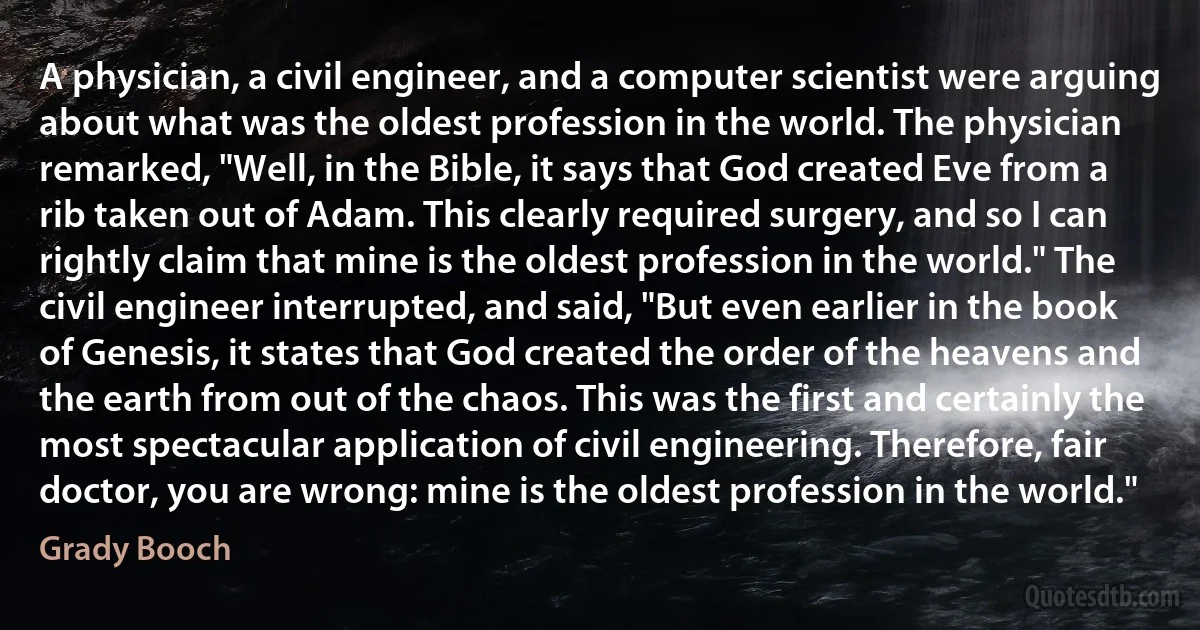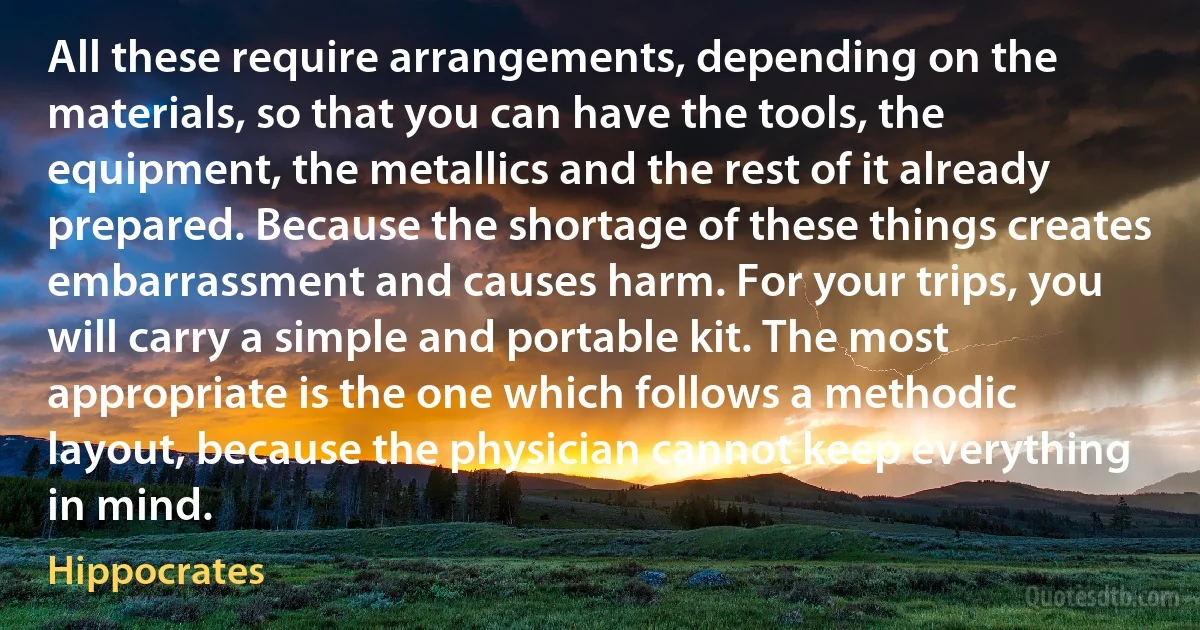Physician Quotes - page 8
You are angry with your neighbor, you despise him, do not like to speak peaceably and lovingly to him, because there is something harsh, abrupt, careless, unpleasant to you in his character, in his speech, in his manners-because he is more conscious of his dignity than perhaps is necessary; or because he may be somewhat proud and disrespectful; but you yourself, your neighbor's physician and teacher, are more guilty than him.

John of Kronstadt
The Lord, before His Incarnation, let mankind experience all the bitterness of sin, all their powerlessness to eradicate it; and when all longed for a Deliverer, then He appeared, the most wise, all-powerful Physician and Helper. When men hungered and thirsted after righteousness, as it grew weaker, then the everlasting righteousness came.

John of Kronstadt
Do you conceive of your Lord as less because? He shows that humiliation is the best road to exaltation (cf. Mt. 23:12); because He humbles Himself for the sake of the soul that is bent down to the ground, that He may even exalt within Himself that which is bent double under a weight of sin?... If so, you must blame the physician for stooping over suffering and putting up with evil smells in order to give health to the sick?

Gregory of Nazianzus
Frederick the Great (1712-1786) once asked his personal physician, Dr. Zimmermann, "Can you name me a single proof of the existence of God?" Zimmermann replied, "Your Majesty, the Jews!" By that he meant that if one wanted to ask for a proof of God, for something visible and tangible, that no one could contest, which is unfolded before the eyes of all men, then we should have to turn to the Jews. Quite simply, there they are to the present day. Hundreds of little nations in the Near East... have dissolved and disappeared in the huge sea of nations; [only] this one tiny nation has maintained itself.... If the question of a proof of God is raised, one need merely point to this simple historical fact. For in the person of the Jew there stands before our eyes the witness of God's covenant with Abraham, Isaac, and Jacob, and in that way with us all. Even one who does not understand Holy Scripture can see this reminder.

Karl Barth
Wholly new forms of encyclopedias will appear, ready-made with a mesh of associative trails running through them, ready to be dropped into the memex and there amplified. The lawyer has at his touch the associated opinions and decisions of his whole experience, and of the experience of friends and authorities. The patent attorney has on call the millions of issued patents, with familiar trails to every point of his client's interest. The physician, puzzled by its patient's reactions, strikes the trail established in studying an earlier similar case, and runs rapidly through analogous case histories, with side references to the classics for the pertinent anatomy and histology. The chemist, struggling with the synthesis of an organic compound, has all the chemical literature before him in his laboratory, with trails following the analogies of compounds, and side trails to their physical and chemical behavior.

Vannevar Bush
[Luigi Ferrarese] is an enlightened and philanthropic physician of Naples, who has for several years been zealously pursuing the study of Phrenology, and endeavouring to promote its application to those branches of science, morals and legislation, which he perceives it so well calculated to benefit. He has met with much persecution, but he has persevered, and it is with pleasure we perceive that there is one mind at least, in Naples, imbued with the importance of his views.

Luigi Ferrarese
On 10th February 1839, he commenced a periodical, named "Il Gatto Letterato, Foglio periodico," dated in Capolago (a town in Italian Switzerland), but printed at Naples (without licence); and for a "Lettera di un Frenologo ad un Dottore degli Stati Pontifici" (" Letter from a Phrenologist to a Doctor in the Papal States"), he was called before the Santa Sede (Holy Tribunal); and afterwards, in 1840, for several other articles, he was seized and imprisoned for 28 days. He was suspended from his office of physician in ordinary to the Royal Lunatic Asylum at Aversa, and crushed to the earth by every engine of persecution which bigotry and tyranny, combined, could employ against Him.

Luigi Ferrarese
It is imperative that we should not pare down the meaning of a dream to fit some narrow doctrine. ... No language exists that cannot be misused. It is hard to realize how badly we are fooled by the abuse of ideas, it even seems as if the unconscious had a way of strangling the physician in the coils of his own theory.

Carl Jung
Normal fear is healthy. It paves the way for one's progress. It preserves life. A Headmaster is afraid of the Inspector of Schools. He takes a very keen interest in training the boys. All the boys get success in the examination. An engine-driver of the Railways is afraid of his superior officer. He is very careful in the discharge of his duties. No collision occurs. A physician is afraid of getting a bad reputation. He takes great care of his patient. He makes researches. He saves many lives. He becomes a famous physician also.

Swami Sivananda
Did Christ or any of his apostles add to the sum of useful knowledge? Did they say one word in favor of any science, of any art? Did they teach their fellow-men how to make a living, how to overcome the obstructions of nature, how to prevent sickness-how to protect themselves from pain, from famine, from misery and rags? Did they explain any of the phenomena of nature? Any of the facts that affect the life of man? Did they say anything in favor of investigation-of study-of thought? Did they teach the gospel of self-reliance, of industry-of honest effort? Can any farmer, mechanic, or scientist find in the New Testament one useful fact? Is there anything in the sacred book that can help the geologist, the astronomer, the biologist, the physician, the inventor-the manufacturer of any useful thing?

Robert G. Ingersoll
When a physician sees that his patient's strength is being exhausted so rapidly by the intensity of his agony that he will die of exhaustion before the medical processes inaugurated have a chance to do their curative work, he administers an opiate. But a good physician is always loath to do so, knowing that one of the influences of the opiate is to interfere with and defeat the medical processes themselves. He never does it except as a choice of evils. It is the same with the use of force, whether of the mob or of the State, upon diseased society; and not only those who prescribe its indiscriminate use as a sovereign remedy and a permanent tonic, but all who ever propose it as a cure, and even all who would lightly and unnecessarily resort to it, not as a cure, but as an expedient, are social quacks.

Benjamin Tucker
I swear by Apollo the physician, and Aesculapius, and Health, and All-heal, and all the gods and goddesses, that, according to my ability and judgment, I will keep this Oath and this stipulation - to reckon him who taught me this Art equally dear to me as my parents, to share my substance with him, and relieve his necessities if required; to look upon his offspring in the same footing as my own brothers, and to teach them this art, if they shall wish to learn it, without fee or stipulation; and that by precept, lecture, and every other mode of instruction, I will impart a knowledge of the Art to my own sons, and those of my teachers, and to disciples bound by a stipulation and oath according to the law of medicine, but to none others.

Hippocrates
Amongst those [works] of the tenth century, of which fragments are now extant, is a system of mineralogy by Avicenna, a physician in whose arrangement there is considerable merit. In the same century also, Omar, surnamed 'El Aalem,' or 'the Learned,' wrote a work on 'the Retreat of the Sea.' It appears that on comparing the charts of his own time with those made by the Indian and Persian astronomers two thousand years before, he had satisfied himself that important changes had taken place since the times of history in the form of the coasts of Asia, and that the extension of the sea had been greater at some former periods. He was confirmed in this opinion by the numerous salt springs and marshes in the interior of Asia,-a phenomenon from which Pallas, in more recent times, has drawn the same inference.

Charles Lyell
If, by being revolutionary, one means rational rebellion against intolerable social conditions, if, by being radical, one means "going to the root of things," the rational will to improve them, then fascism is never revolutionary. True, it may have the aspect of revolutionary emotions. But one would not call that physician revolutionary who proceeds against a disease with violent cursing but the other who quietly, courageously and conscientiously studies and fights the causes of the disease. Fascist rebelliousness always occurs where fear of the truth turns a revolutionary emotion into illusions.

Wilhelm Reich



